The increase in popularity of raising bearded dragons has been on the rise. One interesting question that I quite often hear from paludarium owners with bearded dragons:
“What does it mean when a bearded dragon licks you?”
As comedic as it sounds, this is actually a pretty good question. We imagine dogs licking us is because they love us, but what about bearded dragons?
Do you think your bearded dragon loves you because it licks you?
From the discovery and research that I’ve made, you will learn about these topics in this guide:
- Brief Summary of bearded dragons.
- Learning about bearded dragons’ body language and behavior.
- Their licking habits.
- Jacobson’s Organ.
- Reasons why bearded dragons lick their owners.
- Things that they lick with reasons included.
Since this article is pretty long, you can navigate to a specific topic with the table of content right below.
One of The Top Reptile Pets, The Bearded Dragon
Keeping reptiles as pets can be immensely pleasurable. They make perfect pets as they do not require much space, their needs are understood and they are, in short, very easy to manage. They can be delightful and precious at the same time.
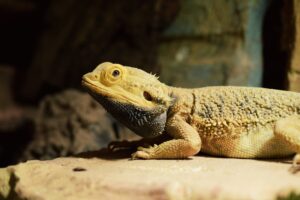
Seeing as there are different kinds of pet reptiles, each with their varying levels of maintenance, it is straightforward to pick one and care for them. One of these adorable pets is bearded dragons.
Top Reptile Pet That Is Manageble
Did you know? 💡 Bearded dragons rank amongst the top reptiles pets that cause no fuss and are very manageable.
They live long and have some unusual behavioral tendencies that are fascinating. You can read on as I decipher everything about their behavior patterns, body language, and why they lick their owners.
SPOILER ALERT: You may be surprised to know that licking comes very naturally to them and is, in a way, their way of life.
Let’s dive a little deeper into the details!
Brief Summary of Bearded Dragons
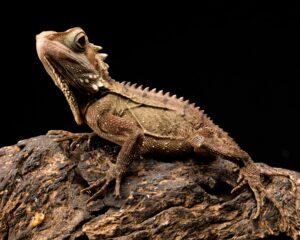
Bearded dragons, short for Beardies, are lizards that originate from Australia.
Where Do Bearded Dragons Reside?
They reside in rugged, rocky, and barren areas of the country and are gifted climbers. In nature, they are generally lounging on branches, resting on the rocks, and hanging around in shadowy areas to keep cool in bushes and different shaded spots.
Did you know? 💡 They like their hiding spots and tend to stay in the shadows once they amass enough heat through basking. Therefore, when they are kept as pets, you must be careful about providing them with ample hiding spots.
They are dubbed “bearded” because of their skill to flare out their skin in the throat area when they feel threatened or need to mark their territory.
The Appearance of Bearded Dragons
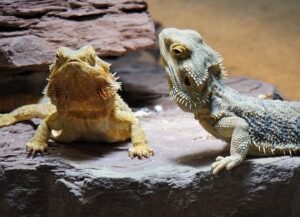
These beautiful dragons have an enormous triangular head shaped with flat bodies that have pointed spines and ridges running along their sides.
Their scales are edged and can appear very dangerous but, in reality –
They are soft, nimble, and not at all sharp.
Are Bearded Dragons Omnivorous?

They are omnivorous, consuming both plants and insects of any kind.
How Big Can A Bearded Dragon Grow?
These reptiles can grow to be sixteen to twenty-four inches long.
Why Bearded Dragons Can Make A Great Pet?
Bearded dragons make tremendous pet material. They do not tend to grow too large; they devour a wide variety of foods, are very active in the daytime, and have a gentle disposition.
These friendly creatures are captive bred; they have curbed care conditions and are easily available and affordable.
A bearded dragon can turn out to be an excellent addition to the household as every member, no matter their age would enjoy its intriguing manners.
The Body Language And Behavior of Bearded Dragons
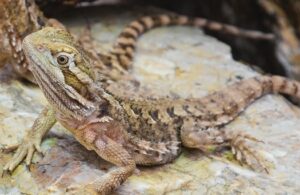
None of their mannerisms is random; they are creatures that depend solely on body language as a way of communication, so all the little actions have meanings.
Did you know? 💡 Since bearded dragons are not vocal, they use body language to interact with their kind, other creatures, and even the family members.
Humans cannot discern these signs intuitively, but a bearded dragon owner needs to understand to interpret their pet’s gestures, so learning these signals is essential.
Common Everyday Behaviors of Bearded Dragons
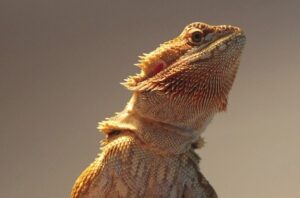
- Waving
- Bobbing head
- Shifting color
- Gaping their mouths
When you appear in front of your pet, they can wave at you as a ‘hi’. While it seems adorable and simple enough, this greeting has a deeper meaning; it says two things that I am here and I arrive in peace so do not harm me. What does it signify?
It signifies as both an indication of having their presence acknowledged and compliance.
That is why scared young beardies feeling insecure will do the wave more often than mature ones.
Waving To Their Own Kind And Head Bopping
Beardies wave among their species and creatures they encounter, too for they are peaceful beings while head bobbing is an indication of domination.
Did you know? 💡 Bearded dragon head bobs when they want to ascertain a social hierarchy.
Their quick head bobs are a sign of warning. Slower bobs mean to indicate submission. They can also change colors due to temperature shifts.
Should You Be Alarm When Your Bearded Dragon Changes Color?
While it is not alarming, if your bearded dragons exhibit a specific color for a prolonged time, you must look into their temperature. They also enjoy basking in the light as one of their favorite things to do.
Fun Fact: Bearded dragons often open their mouths during basking to stave off overheating.
Keeping their mouths open is reasonable if it happens in shorter periods, but for longer, it could imply that their terrarium is too heated or there could be some other health issues.
Bearded Dragons And Their Licking Habits
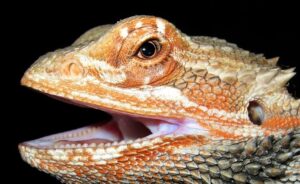
The licking nature of bearded dragons is their manner of accustoming themselves to their environment. They like to familiarize themselves.
Every lick collects particles that trigger the Jacobson’s Organ to help them comprehend their surroundings better.
Further, their perception of smell intensifies by the way they lick stuff around them.
Additional Info To Their Licking Behavior
Allow me to explain further; what you call licking behavior in bearded dragons is not how you may be able to interpret and relate to the term.
However, since it has the exact manner and feeling of what we know as licking, it is referred to so much.
In reality, Beardies wield their tongue to get a real impression of their surroundings, and in doing so, they accumulate components that emit receptive signals to their Jacobson’s Organ.
The Driving Force Behind Their Licking Behavior
Curiosity is the driving force behind this licking behavior, and this aspect of interest plays a significant role in explaining the licking behavior seen in Beardies.
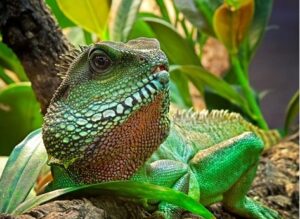
With each lick, bearded dragons can get a satisfactory grasp on the atmosphere around them as they are very far away from their homeland in Australia.
Just bred bearded dragons are particularly interested in the atmosphere around them and tend to show this licking behavior more frequently.
Earlier in this section, I mentioned Jacobson’s Organ. You might probably be curious and wondering what the heck that is, right?
Learning About Jacobson’s Organ
Now I come to the more scientific part of this behavior now that you can understand better what drives these lizards to lick in the first place.
The Meaning: When these beardies flick their tongue, there are tiny particles that compile on their tongue, which then pushes it into the upper part of their mouths. This top part is entirely connected to a crucial sensor, which is known as the Jacobson’s (or the vomeronasal) Organ.
This Organ is significant as it not only analyzes this information from the tongue but also transforms it into a knowledge that can calm the bearded dragons and help them to understand their surroundings.
Did you know? 💡 This whole process happens in a flash and cannot be discerned by the human eye.
It is a complex way of nature that allows these creatures to comprehend their location and act accordingly. So what does it exactly mean when a bearded dragon licks you?
What Does It Mean When A Bearded Dragon Licks You?
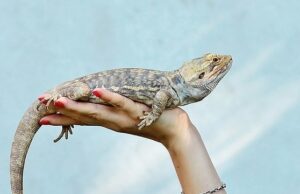
As you have gathered, licking comes very naturally to bearded dragons and is akin to breathing, while they may be gentle creatures that like their peace, they do need to acquaint themselves with their surroundings and feel secure.
Therefore – if your bearded dragon has licked you, you can now guess why they did that, right. Yes, to familiarize themselves with you.
It generally means they are using their tongues to check you out and see how they feel.
It is a kind of testing of waters as getting known with you. Employing their tongues to get a scent and feel of not just you but also the surrounding environment.
How Does This Relate To Jacobson’s Organic?
Therefore, what it all boils down to not licking you to get a bite; they are only flicking their tongues to amass microscopic particles that Jacobson’s Organ then deciphers.
Bearded dragons lick you as an interwoven method of interaction and understanding.
In a computerized way, its tongue is gathering, and then sending data to its Jacobson’s organ, which in return educates him about the general danger or peace level around him.
Nature indeed works in beautiful and mysterious ways.
Other Things Bearded Dragons Lick And Their Reason For It
Bearded dragons are not limited to licking human beings; for them to survive and live long; they employ this method to assess every situation. It is part of their anatomical system.
Things They Lick
Some of the things that beardies love to lick are:
- Items placed in their habitats.
- Food.
- Family members.
Reasons For Licking
- Assessing the temperature: Bearded dragons are always very curious about the temperature of articles in their proximity. Thus, repeatedly, the licking behavior seen in them can be an experiment on their part to establish how hot or cold a thing can be.
- Texture: Another interesting aspect is that bearded dragons are continually curious about the texture of things. That is another reason you will find them just licking away to gauge the texture of things around them to understand how smooth or rough something is.
These characteristics deduce how smart Beardies are, as they need to have an idea of everything, and they make sure to lick whatever comes their way before they can use it or eat it.
Every new item you place in your pet’s terrarium will lick it to get some familiarity before using it.
It makes them feel safe and in control.
Bearded Dragons’ Frequently Asked Questions
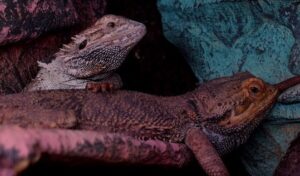
Why Do Bearded Dragons Lick Their Lips?
If you have discovered that your Beardie is continuously licking his lips and looking uncomfortable, there is a reasonable cause for this, and a high probability is that he is feeling thirsty.
This could also be a manifestation of how you are not giving it sufficient water.
Nevertheless, providing water for them is not so simple, they will not drink out of a bowl of still water; they want water that mimics their natural habitat like flowing water.
What you should do: The best direction to take is to imitate this by using a dropper and then consider a water dispenser for long-term usage.
Should You Pet Your Bearded Dragon?
While these creatures prefer to be by themselves and most tend to stay aloof to any affection, you can always put them in a restricted manner, so they do not flatten out of fear as some do enjoy petting.
Bearded dragons do sense and display some extent of emotion. Treat them well. 🙂
Start by unhurriedly stroking its head and sides of the face. You can also touch it gently from head to tail, moving slowly and using mild pressure.
TIP: Do not position yourself straight over the bearded dragon’s head while petting because it can feel endangered by any movement above them. Be gentle and loving while also being mindful of the dos and don’ts.
What Does It Mean When A Bearded Dragon Flattens Its Body?
There can be a myriad of reasons for this.
- Defense Mechanism
- Ailment
Defense Mechanism
If he feels threatened, he will flatten out his stomach because, in this state, it will feel larger and more of a challenge to its enemy.
Actions to take: You must leave him to be, so he gets the sense that his predator has left.
Do not stand tall and hover over, as it will only worsen the situation.
Ailment
Another reason could be some ailment; if he feels sick or lethargic, he may do this, too.
The best course of action is to check in with the vet. This posture can also be a tactic to regulate its body temperature. If you find your beardie sprawling on a rock, it is only basking, and as I explained earlier that it is one of their favorite past times.
For these lizards, body temperature regulation is of the utmost importance; otherwise, they can fall seriously sick.
From VivariumTips,
With all said and done, now you have a complete and thorough understanding of what it could mean when a bearded dragon licks you, what brings forth this behavior, and how to deal with it.
With these creatures, their entire existence relies on being acquainted with their surroundings, gauging everything around them, feeling things, and deciding if they are in safe territory and what should be their stance accordingly.
Getting a sense of their surroundings: Bearded dragons are inclined towards licking things around them to get a sense of what’s going on.
Nature created their system in a way where the Jacobson’s Organ plays a crucial role in this process, assuring that Beardies get a factual image of their atmosphere.
Furthermore, it does assist with their pheromone detection, which, therefore, helps immensely with cohabitation of bearded dragons, too.
If you enjoyed this article about bearded dragons, you might also like:
- What Happens When You Leave Your Bearded Dragon’s Lights On At Night?
- Can I Leave Crickets With My Bearded Dragon Overnight?
Looking for a bearded dragon community?
Feel free to ask any questions related to this article and support this blog by sharing articles with your friends! 🙂

